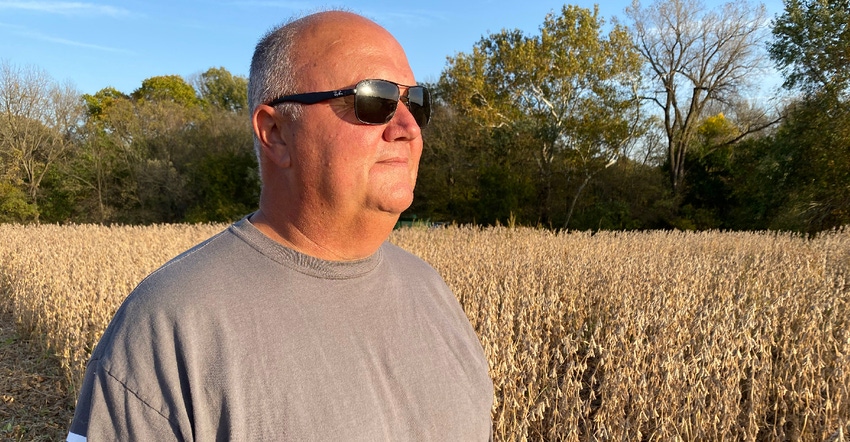
When Tim Mershon had the opportunity to plant all his soybean fields to Asgrow’s XtendFlex soybeans this year, he jumped at the chance. The decision paid off with a whole farm average of more than 60 bushels per acre.
“I’ve been watching this technology for the last three to four years,” the Buckner, Mo., farmer says. “Our worst nightmare is waterhemp. It’s been our toughest weed to control. I knew I really needed this.”
Asgrow XtendFlex soybeans offer a triple-stacked soybean trait containing tolerance to dicamba, glyphosate and glufosinate. The EPA recently approved a new five-year registration for XtendiMax herbicide with VaporGrip Technology for use in the XtendFlex soybean growing system. These soybean varieties are now approved and available for the 2021 planting season.
However, before this approval, Asgrow contacted farmers such as Mershon to test the products in the field.
He says planting Asgrow XtendFlex soybeans kept his fields clean by being able to spray glufosinate when needed. “I did not have to worry about rinsing out my sprayer,” Mershon notes. “That was huge.”
With all the soybeans on one program, there was less downtime cleaning and switching chemicals. Mershon could choose the best field to spray on any given day. “That was probably one of the biggest benefits of the XtendFlex soybeans.” At harvest, he soon found a second benefit — yield.

Mershon’s path to achieve more than 60-bushel-per-acre average yields was not straight this growing season.
Mershon began planting soybeans May 10. “It was a great start,” he says. “Earlier than we’ve ever put beans in the ground.”
The weather cooperated for much of May and into early June, but then it turned dry. “I was really kind of starting to panic,” he says.
Fortunately, in July, the rains came. Unfortunately, they blanketed the area for weeks with wet conditions. Mershon and other farmers in the area thought the rain would never stop. Then, true to Missouri’s wild weather patterns, the rain stopped, and it turned dry again.
Mershon wondered if the soybeans would even yield. As his stood alongside the Asgrow XtendFlex soybean field in September, he saw hope. “They looked really good,” he says. “They kept growing all season long.” But as any farmer knows, sometimes appearances can be deceiving. So, he waited until the yields came in to assess these new soybeans.
Proof of production
Mershon has been planting Asgrow soybeans for many years. “I started farming on my own, with my dad’s guidance, in 1987,” he says. “We are fortunate that my parents still live on this farm.”
It is a farm that has been in the family since 1863. Mershon farms along with his brother, raising row crops and cattle. Over the years, he has seen his share of ups and downs with soybean variety performance. However, this technology has him excited.
“I don’t think anybody has anything that is going to run with these varieties,” Mershon says. “The yield potential that these beans have over any other varieties out there is the biggest thing going for them. If they yielded this well under stress, I think they have more yield potential to give under normal growing conditions.”
Mershon planted AG38XF0, AG40XF0 and AG42XF0 in 2020. For the 2021 growing season, Asgrow will have 47 soybean varieties across all maturity groups, ranging from relative maturity of 0 to 7, with multiple varieties in each relative maturity group. “I will still go back to some of those same numbers,” he says, “because they did very well for us.”
The fourth-generation farmer says technology in soybeans today will only benefit the future of his operation. “My son plans to come back to the farm after graduating from college,” he says. “You hope that with more yield, there is more income. It seems they keep pushing yields higher and putting technology in the seed to help reduce inputs. I only see it getting better.”
About the Author(s)
You May Also Like






